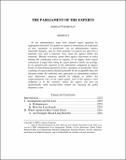| dc.contributor.author | Vermeule, Cornelius Adrian | |
| dc.date.accessioned | 2015-01-14T21:38:44Z | |
| dc.date.issued | 2009 | |
| dc.identifier.citation | Adrian Vermeule, The Parliament of the Experts, 58 Duke L. J. 2231 (2009). | en_US |
| dc.identifier.issn | 0012-7086 | en_US |
| dc.identifier.uri | http://nrs.harvard.edu/urn-3:HUL.InstRepos:13614228 | |
| dc.description.abstract | In the administrative state, how should expert opinions be aggregated and used? If a panel of experts is unanimous on a question of fact, causation, or prediction, can an administrative agency rationally disagree, and on what grounds? If experts are split into a majority view and a minority view, must the agency follow the majority? Should reviewing courts limit agency discretion to select among the conflicting views of experts, or to depart from expert consensus? I argue that voting by expert panels is likely, on average, to be epistemically superior to the substantive judgment of agency heads, in determining questions of fact, causation, or prediction. Nose counting of expert panels should generally be an acceptable basis for decision under the arbitrary and capricious or substantial evidence tests. Moreover, agencies should be obliged to follow the (super)majority view of an expert panel, even if the agency's own judgment is to the contrary, unless the agency can give an epistemically valid second-order reason for rejecting the panel majority's view. | en_US |
| dc.language.iso | en_US | en_US |
| dc.publisher | Duke University School of Law | en_US |
| dc.relation.isversionof | http://scholarship.law.duke.edu/dlj/vol58/iss8/7/ | en_US |
| dash.license | LAA | |
| dc.title | The Parliament of the Experts | en_US |
| dc.type | Journal Article | en_US |
| dc.description.version | Version of Record | en_US |
| dc.relation.journal | Duke Law Journal | en_US |
| dash.depositing.author | Vermeule, Cornelius Adrian | |
| dc.date.available | 2015-01-14T21:38:44Z | |
| dash.contributor.affiliated | Vermeule, Cornelius | |


